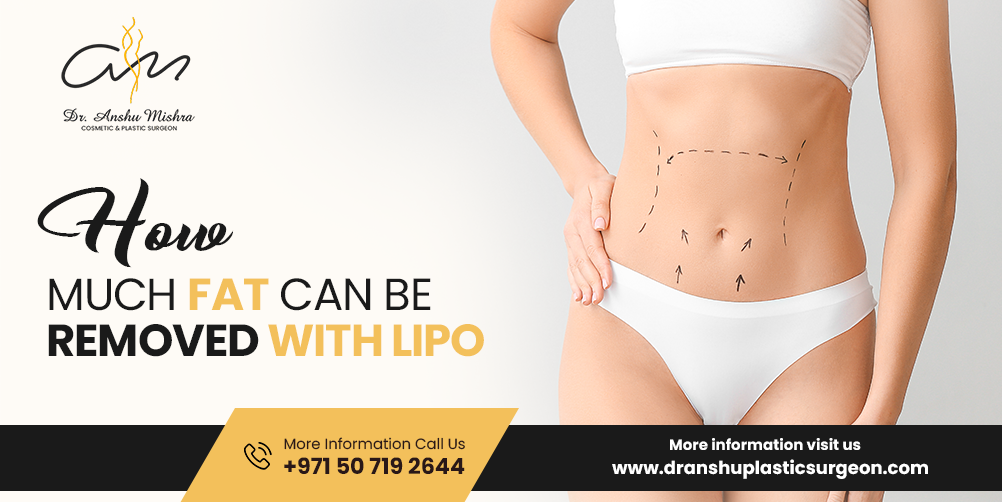In today’s world, many people focus on their health and strive to stay fit. They seek lifestyle changes to boost their confidence and enhance their appearance. One common concern is whether belly fat will return after liposuction. Will the procedure make them look permanently slim? The answer largely depends on the diet and lifestyle changes adopted after the procedure.
For those wondering about belly fat regrowth after liposuction, consulting with Dr. Anshu Mishra is highly recommended, she offer world class facility during liposuction in Dubai. As a specialized surgeon in cosmetic procedures, she provides expert guidance on maintaining body shape after surgery.
Table of Contents
ToggleWhat Is Liposuction?
Liposuction is a cosmetic procedure designed to remove unwanted fat from specific areas of the body, such as the abdomen. It effectively targets stubborn fat deposits that do not respond to diet and exercise alone.
How Does Liposuction Remove Fat?
Liposuction involves surgically removing fat deposits from areas like the thighs, arms, hips, and abdomen. During the procedure, doctors insert a thin tube called a cannula under the skin to break up and suction out fat cells. Traditional liposuction techniques refine body contours and improve overall appearance while minimizing risks.
Once fat cells are removed through liposuction, they do not regenerate in the treated area. However, if a person gains weight after surgery, the remaining fat cells in both treated and untreated areas can expand, altering overall body shape.
Does Liposuction Remove Fat Permanently?
Although liposuction is highly effective, many people question whether it can permanently eliminate stubborn fat. The procedure involves suctioning fat out of targeted areas using hollow tubes and suction devices. Liposuction permanently removes fat cells from treated areas, meaning they do not grow back. However, weight gain can still cause existing fat cells to enlarge.
Where Does the Fat Go After Liposuction?
Once fat cells are removed via liposuction, they leave the body permanently and will not regenerate in treated areas unless there is significant weight gain. In some cases, fat cells may be transferred to other areas, such as the breasts or buttocks, for enhancement. These transferred fat cells remain in the new location and do not metabolize like naturally occurring fat.
Can Fat Return After Liposuction?
Liposuction permanently removes fat cells from treated areas, but fat regrowth is possible if a person gains weight post-surgery. While new fat cells do not form in treated areas, the remaining fat cells can expand, altering body composition. To maintain results, it is essential to follow a balanced diet and exercise regularly.
If a patient maintains their post-lipo weight, the fat does not return. For instance, if a person weighed 75 kg before liposuction and had 4 kg of fat removed, they should maintain their weight at or below 70 kg to prevent fat regrowth.
Factors That Influence Fat Regrowth After Liposuction
- Amount of Fat Removed – Removing a significant amount of fat leaves fewer fat cells that could expand later. More conservative fat removal may still allow some cells to hypertrophy.
- Number of Years Since Surgery – Fat cells can gradually expand over the years, affecting results over time.
- Weight Gain – If a patient gains a substantial amount of weight, remaining fat cells in untreated areas may expand, leading to unpredictable results.
- Weight Fluctuations – Frequent weight shifts increase the likelihood of fat hypertrophy and body shape changes.
- Liposuction Technique – A skilled surgeon can ensure precise fat removal to minimize the risk of fat reaccumulation in treated areas.
- Lifestyle Factors – Poor diet and lack of exercise contribute to weight gain and fat accumulation.
- Aging – As metabolism slows with age, maintaining results requires consistent effort.
Tips to Maintain Your Liposuction Results
Liposuction can come up with the body contour you’ve been dreaming of, but keeping the ones results takes an attempt. Here are some key tips to help you hold your new shape for a long time:-
- Maintain a Healthy, Balanced Diet– Eating a healthy weight-loss plan helps hold your weight strong and stops immoderate fat from accumulating in the areas that weren’t dealt with. Focus on complete ingredients like vegetables, lean proteins, and healthy fat, at the same time as limiting processed foods and sugar.
- Stay Active– Aim for at least 30 minutes of daily exercise routine or on alternate days . Being active will assist maintain your metabolism high and your body toned.
- Keep Your Weight Stable– The key to maintaining your liposuction results is maintaining a consistent weight as weight gain can make the fat cells in untreated areas bigger. Keeping your weight healthy facilitates keeping your average body proportions.
- Stay Hydrated– Drinking plenty of water facilitates fat metabolism and improves skin elasticity.
- Get Enough Sleep– Adequate sleep is prime for healing and weight control. Aim for 7-9 hours every night to maintain your metabolism.
- Follow Your Surgeon’s Guidelines– Your surgeon will offer personalized recommendations for recovery and maintaing results. This may also include wearing compression garments, avoiding certain activities in the course of healing, and scheduling follow-up appointments to track your progress.
The Role of Lifestyle Changes in Liposuction Results
Consistency in healthy habits is crucial for maintaining liposuction results. Regularly monitoring body composition and maintaining a balanced lifestyle can help prevent fat regrowth and maintain body contours.
- Importance of Consistency in Healthy Habits- Consistency is important to sustaining the results of Lipo. Developing and retaining healthy conduct, consisting of balanced eating and normal workouts, is crucial for long-term success. Small, constant efforts frequently yield the best results, supporting you maintain a flat belly and prevent fats from returning.
- Monitoring Changes in Body Composition- Regularly tracking your body composition permits you to stay on top of your post-liposuction development. Tools like body fat scales or professional tests can offer insights into how properly you are keeping your results and what adjustments can be done.
Conclusion
Liposuction permanently removes fat cells, but maintaining a healthy lifestyle is crucial to prevent fat from returning. Regular exercise and a proper diet play key roles in sustaining results. If you want expert guidance on body contouring and achieving long-lasting results, consult Dr. Anshu Mishra today. As an experienced cosmetic specialist, she can help you achieve your desired body shape. Book your consultation now!
FAQs
-
Will my stomach be flat after liposuction?
Liposuction effectively removes fat cells from the treated area, giving a flatter stomach. However, achieving and maintaining a flat stomach depends on post-surgery care, including a balanced diet and regular exercise. While liposuction eliminates fat deposits, it does not tighten loose skin. Patients with good skin elasticity typically see better results, while those with excess skin may require additional procedures, such as a tummy tuck, for a firmer appearance.
-
Will my stomach continue to shrink after liposuction?
Yes, swelling after liposuction gradually subsides over weeks to months, revealing a more contoured stomach. As the body heals, skin adjusts to the new shape, and final results become more visible. Wearing compression garments, following post-operative care instructions, and maintaining a healthy lifestyle can further enhance results. However, additional fat loss will only occur through diet and exercise.
-
Does stomach fat come back after liposuction?
Liposuction removes fat cells permanently, but weight gain can cause remaining fat cells in untreated areas to expand. If patients maintain a stable weight through healthy habits, the results are long-lasting. However, excessive weight gain can alter overall body shape, potentially leading to fat accumulation in untreated areas rather than the stomach.
-
Is liposuction safe for belly fat?
Liposuction is a safe and effective procedure when performed by a qualified surgeon like Dr. Anshu Mishra. It is best suited for removing stubborn fat that does not respond to diet and exercise. While the procedure is generally safe, risks such as infection, swelling, and uneven contouring exist. Choosing an experienced surgeon and following post-operative care instructions can minimize complications and ensure a smooth recovery.
-
What happens to your body years after liposuction?
Years after liposuction, the treated areas generally maintain their improved contours as long as the patient does not gain significant weight. However, natural aging, hormonal changes, and metabolism slowdowns can influence body composition over time. Maintaining a healthy lifestyle, including proper diet and exercise, is essential to preserving liposuction results in the long run.














